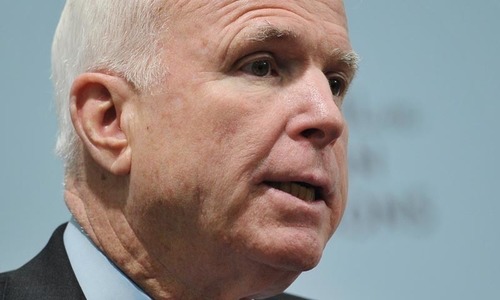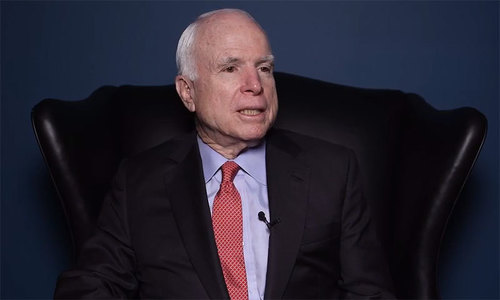WASHINGTON: Key Trump aides are exploring the possibility of replacing US troops in Afghanistan with private military contractors, the US media reported on Tuesday.
Raymond Davis, who killed two Pakistani citizens in Lahore in 2011 and recently published his version of that incident, was also a private military contractor and had worked in both Pakistan and Afghanistan.
The New York Times, which first reported the news, said that at least two top advisers of US President Donald Trump, including his son-in-law Jared Kushner, were discussing the idea with other senior members of the Trump administration.
The report claimed that on Saturday, another top adviser, Stephen Bannon, sought out US Defence Secretary Jim Mattis at the Pentagon to try to get a hearing for their ideas.
“Mr Mattis listened politely but declined to include the outside strategies in a review of Afghanistan policy that he is leading along with the national security adviser, Lt Gen H.R. McMaster,” the report added.
The idea was the brainchild of two men who have made millions of dollars sending private soldiers to America’s wars. One of them is Erik Prince, who founded the private security firm Blackwater, which also reportedly had a major presence in Pakistan.
The other person behind the idea, Stephen Feinberg, is a financier who owns mega military contractor DynCorp International, another private company that provides security and operational support to the US military and also specialises in intelligence training and contingency operations.
The US media reported that Mr Kushner and Mr Bannon had recruited the two private defence contractors to suggest plans for Afghanistan that could minimise US losses in that war-torn country.
The media suggested that since President Trump has authorised his defence secretary to determine the size and nature of US military deployment in Afghanistan, Mr Bannon approached him to see if he would be interested in sending private contractors.
Secretary Mattis said at a news briefing last month that the Pentagon was finalising its plan for stabilising Afghanistan and would soon present it to the White House. US generals have said that Washington will have to substantially enhance its military presence in Afghanistan if it wants to win the war against the Taliban and other militant groups.
The US media, however, reported that the White House was “unhappy with what it has heard so far” from the Pentagon and “the White House and Pentagon continue to spar over what to do in America’s longest war”.
“The proposal has raised eyebrows among critics, who say the incident reveals a divide between President Trump’s top generals and his advisers, and raises questions about a potential conflict of interest,” a popular news site, The Daily Beast, reported.
The New York Times noted that “the highly unusual meeting (between Mr Bannon and Secretary Mattis) dramatises the divide between Mr Trump’s generals and his political staff over Afghanistan.
The meeting also highlighted “the lengths to which his aides will go to give their boss more options for dealing with it and the readiness of this White House to turn to businesspeople for help with diplomatic and military problems,” NYT added.
However, a 2016 report by the Congressional Research Service showed that private military contractors in Afghanistan outnumbered US troops by a 3-to-1 margin, raising questions again about the role those workers played in the ongoing wars overseas and the oversight they received.
The data shows contractor numbers in both Iraq and Afghanistan dating back to fiscal 2007. Combined, the US Defence Department spent more than $220 billion on contractors in the two war zones for a variety of services and support.
The numbers show that the non-military defence workers have outnumbered US troops in Afghanistan continuously since mid-2011, even as the numbers of both have drawn down steadily. But the ratio between the two groups continues to widen as administration officials work to reduce the roles played by armed military personnel in the war-torn country.
Published in Dawn, July 12th, 2017















































